Headcount Planning Checklist: A Comprehensive Guide
Discover the strategic value of headcount planning in our comprehensive guide. We delve into its importance for financial leaders and provide a...
Grow your business with confidence. In this headcount planning / workforce planning guide, learn how to plan headcount accurately in minutes (not weeks).

Why is the headcount planning process important?
How to do headcount planning (in 7 steps)
Step 1. Identify goals (and challenges)
Step 2. Collect required data
Step 3. Build your organizational chart
Step 4. Identify hiring gaps
Step 5. Align all stakeholders
Step 6. Forecast costs
Optional: Plan for multiple headcount scenarios
Step 7. Monitor your headcount plan
People make up ~70% of a company’s spend. Yet most senior execs don’t create well-defined headcount plans that tie back to business outcomes.
The result: Subpar teams that are operationally ineffective and financially inefficient. These are teams that often fail to meet org goals.
That’s why headcount planning is important to grow your business. The cost of making a mistake is high. If you hire the wrong people, don’t you risk wasting time and money?
In this guide, you’ll learn how to create a successful headcount plan FAST.
We’ll use Agentnoon – a workforce planning software to help us with the headcount planning process. Using the tool isn’t essential, but it’ll help you save ~2 weeks.
By the end, you’ll be able to plan headcount in hours. Not weeks.
(… without the needless complexity, headaches, or guesswork.)
Let’s dive right in.
Headcount planning (aka headcount modeling, org charting or workforce planning) is the process of setting up your workforce to help achieve your business goals. Check out Headcount planning checklist.
In simple terms: figure out key hires to make so your company can achieve its short and long-term goals.
Here’s what workforce planning looks like in Agentnoon:
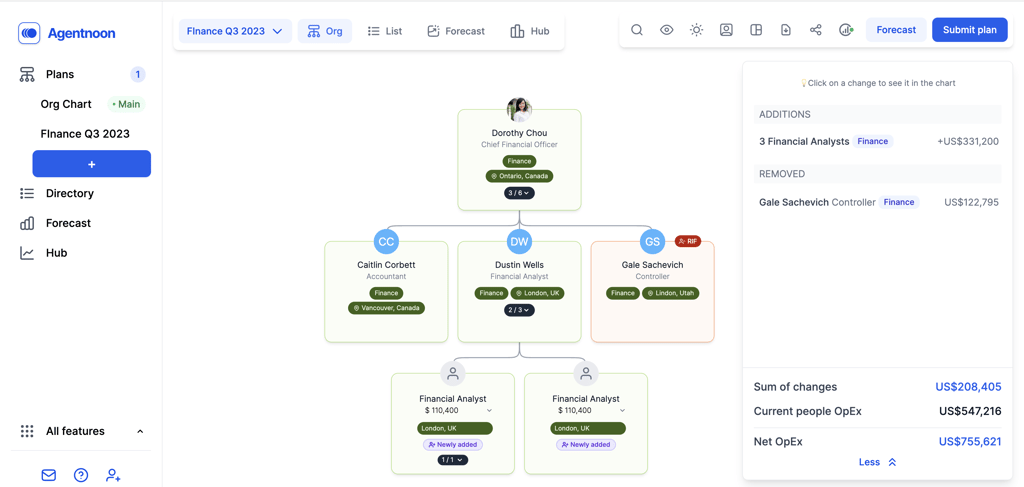
Headcount planning or Workforce planning aren't just an HR buzzword.
It’s a strategic exercise that’ll help you hire the right people with the right skills to execute your company strategy. Without going over your headcount budget.
At a high level, here’s how headcount planning works:
We’ll dive into each step in greater detail.
“The number one fixed cost is people.”
– Sahil Lavingia, The Minimalist Entrepreneur
People are your company’s biggest expense. But they’re also your strongest asset. Why not allocate your biggest spend wisely to hit your growth goals?
That’s where headcount planning comes in.
Without a headcount plan, you have no way of knowing if you can sustain expansion or scale successfully. It’s like shooting in the dark.
On the flip side, companies that plan headcount have a ~2.2x higher chance of success:
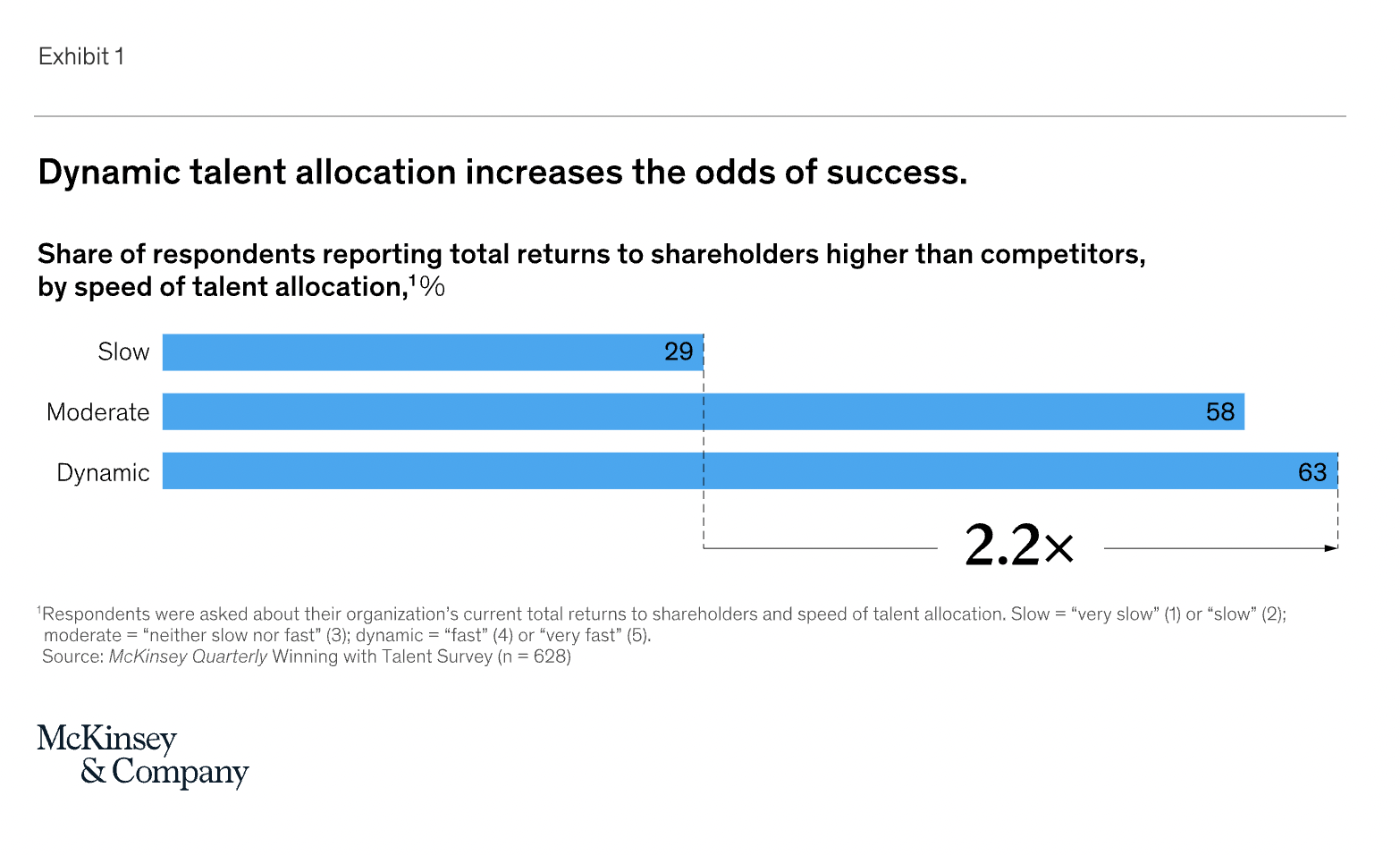
Dynamic workforce planning (aka headcount planning) is the future of work.
Still not convinced?
Bottom line: Headcount planning is about being proactive. Not reactive. It helps you connect the dots between growth, talent, and budget.
An investor’s success relies on effective capital allocation. Your success as a business leader relies heavily on allocating talent effectively.
At large orgs (>200 people), workforce planning is complex and time-consuming. In early-stage startups (<50 people), it’s ad hoc and relies mostly on guesswork. Which is why most CEOs dread it.
Not anymore.
Here are 7 steps to accurately plan headcount, FAST.
Are you an Agentnoon user? Here’s a simple headcount planning process:
Let’s cover each step in detail:
Staff Planning or Headcount planning starts with Identifying your business goals. Your goals are your “why”. If you know your “why”, the “how” slowly reveals itself.
Start listing out your organizational goals as they relate to growth.
For example, your goals might be:
Once done, ask yourself: “what’s preventing me from achieving these objectives?”
In other words, carry out a quick gap analysis:

Make a note of all the challenges (or gaps) preventing you from hitting your goals. More often than not, it’s a lack of the right people in key areas that are a major bottleneck.
Maybe you’re not growing fast enough. Is the problem a lack of consistent leads? Or is sales unable to close leads? Based on the answer, you might need to bolster your marketing team. Training your sales team is another option.
Trying to expand into new markets? You might need to build an expansion team. Maybe you don’t have employees with the right skills in your current workforce. You’d benefit from hiring someone with experience leading companies into new markets. That's where an effective workforce planning process comes to play and exactly why good workforce planning softwares are needed.
You’re training to gain clarity on two things:
This is the most crucial step in this exercise. Don’t skip it.
Or as Abraham Lincoln said:
“If I only had an hour to chop down a tree, I’d spend the first 45 mins sharpening my ax.”
To do staff planning effectively, we need to collect key employee data. Without it, your headcount plan is as good as a bunch of guesses. Most of which will be wrong.
Here are a few inputs you need to collect:
This is where things start getting complicated. Most companies (and yours) use different HRIS, ATS, and FP&A tools. Each tool has different data points.
You’ll have to perform some gymnastics to bring all your headcount data into one place.
You have two options:
Export your data from these tools. Import everything into a Google Sheet (or Excel). This will save you some money. Keep in mind: working in Sheets is time-consuming and prone to errors.

Or you can use Agentnoon.
Upload your Sheets data into Agentnoon and you’ll be up and running in ~15 minutes.
Once done, you’ll find all your people data organized visually in Agentnoon's organizational chart.
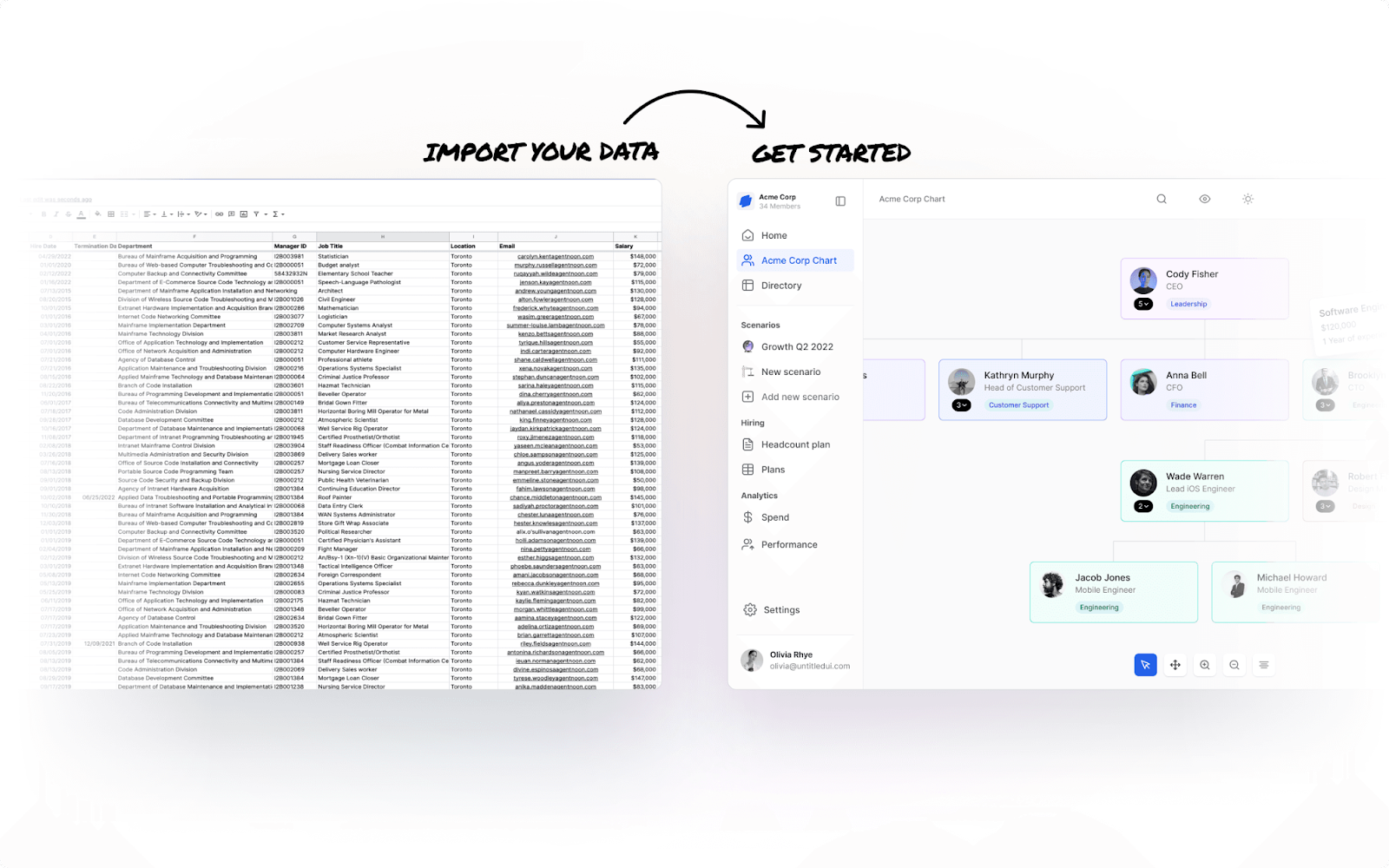
With Agentnoon you can:
All in one place.
The best part: Agentnoon integrates with 100+ HRIS, ATS, and HR tools. Which means setup is as easy as a few clicks and let's you do your headcount planning in minutes.
No app downloads. No complex migrations. It’s that simple.
This makes Agentnoon your central repository of employee information:


Review the people data you’ve collected so far. Look at team sizes, ratios, and comp benchmarks. Reconcile these insights with your goals (from step 1). This will make your headcount planning accurate.
But that’s not all. Analyzing your people has other tangible benefits:
Optional: Talk to current employees. Data can only tell you so much, but employees have a better pulse on the current business situation. Do they feel overworked? Is their department understaffed? Do they have a strong enough team to hit their goals?
Headcount planning is easy and intuitive when you visualize your organization.
The best way to visualize your organizational structure? Create an org chart.
Here's a list of 10 best org chart software in 2023.
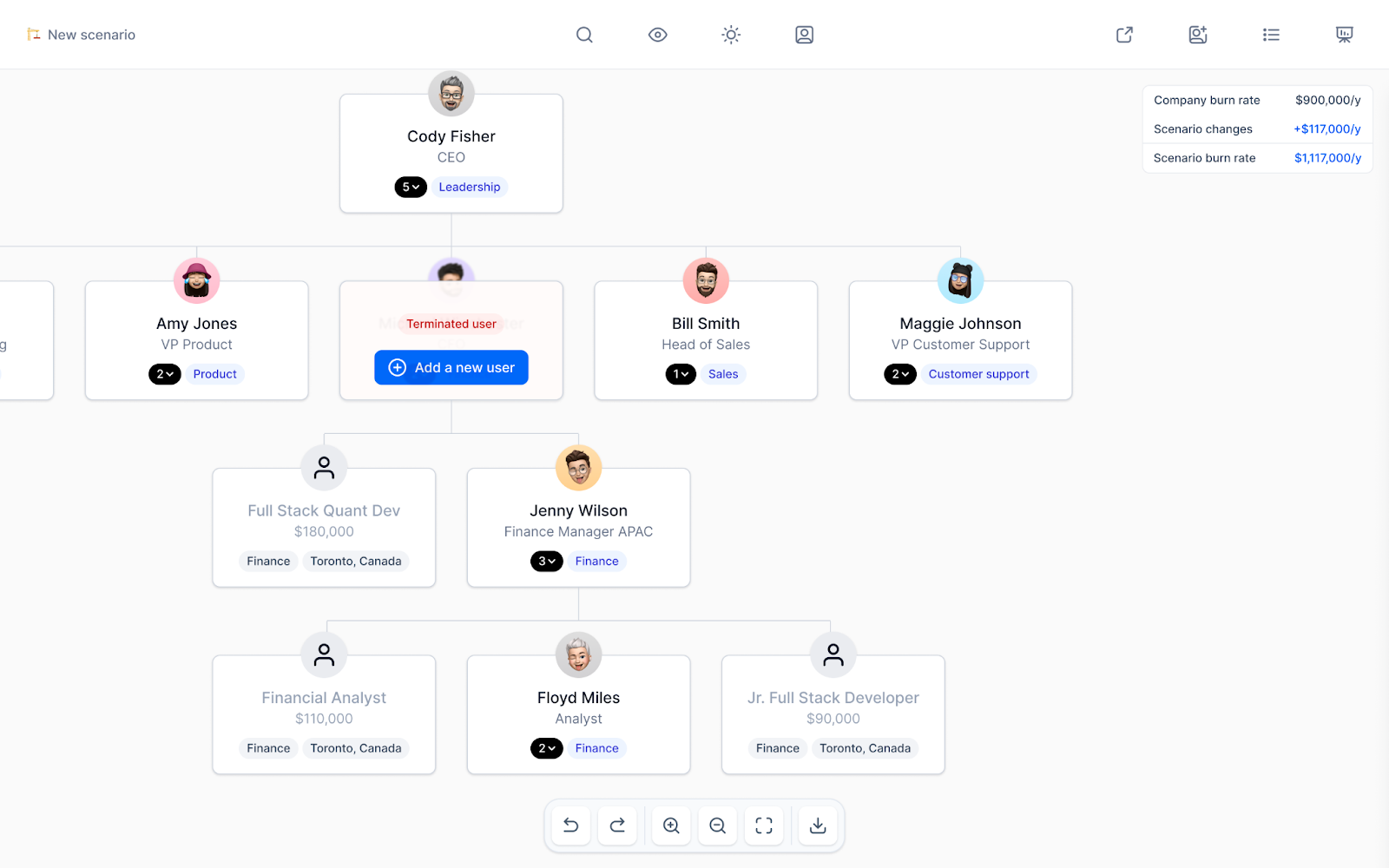
So far we’ve identified our business goals, challenges, and analyzed the required data. In this step, we’ll use these inputs to build out an org chart.
There are many ways to design an org chart:
If you uploaded your Google Sheets data (from step 2) into Agentnoon, you’ll be automatically greeted with a beautiful org chart:
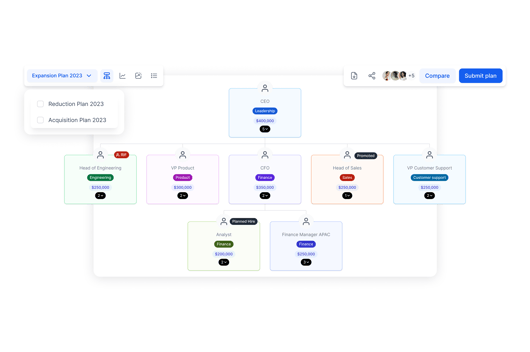
Most org charts are structured top-down. You, as founder or CEO, start at the top, followed by senior execs, and finally direct reports.
In this step, we’re going to create an ideal org chart. This means we’ll add the exact hires we need to make in key departments.
Determining your ideal headcount will require some math. But if you carry out steps 1 and 2, it’ll be easier and more accurate. Once done, highlight these roles with a different colour so you know which gaps to fill.
In Agentnoon, you can seamlesslydo headcount planning with our intuitive org chart software. Drag-and-drop role templates, slice and dice your org chart with powerful filters, and plan for different futures:

We’ll also give you real-time data on how your changes impact budget:
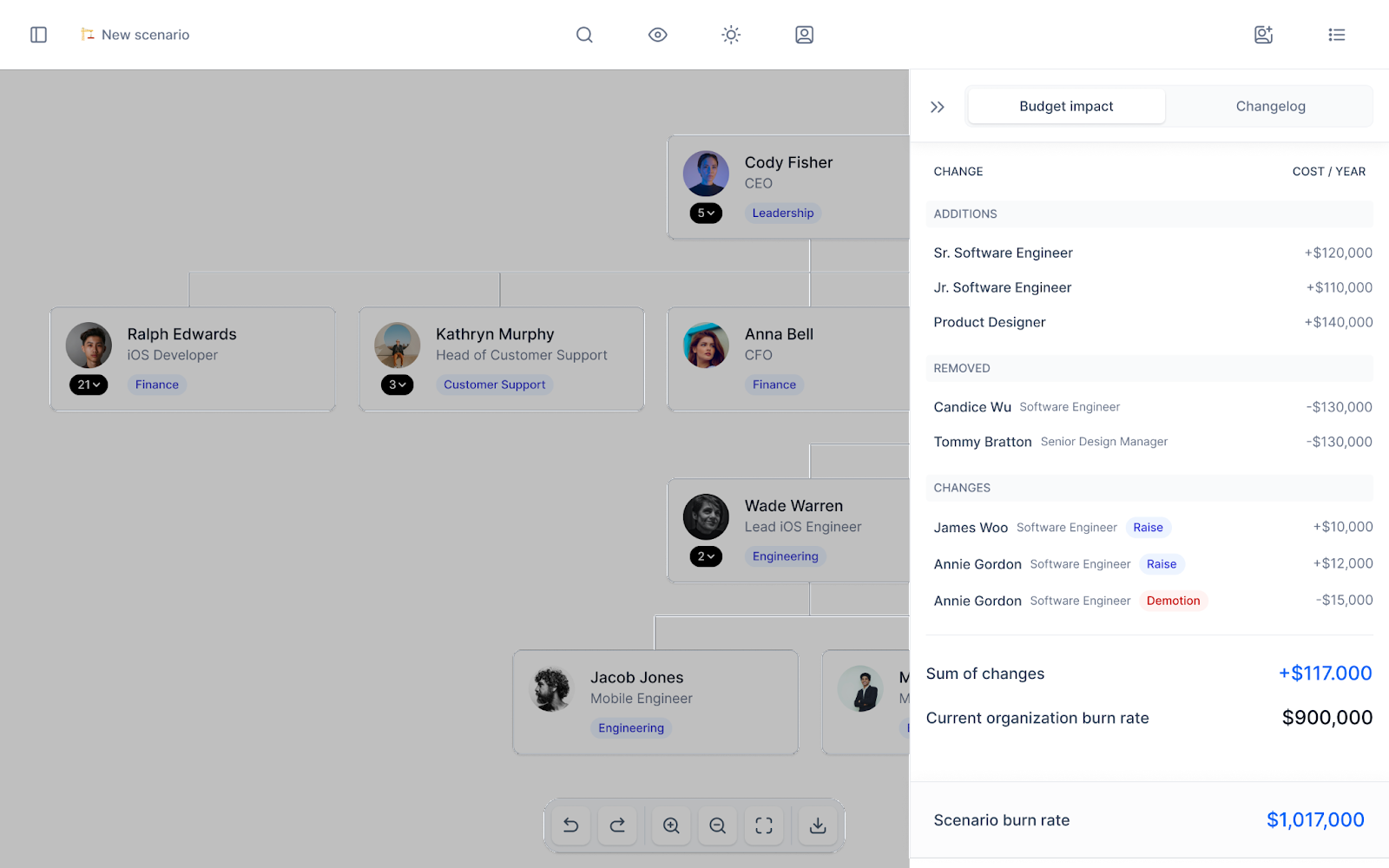
New blog: The SaaS Org Chart
— David Sacks (@DavidSacks) July 23, 2021
You've raised a new funding round. You need to staff up. Here's what that looks like.https://t.co/6ZIGO8Jlx1
Further Reading: The (Interactive) FTX Org Chart
This is the most straightforward step in the headcount planning process.
We’re going to answer: “who do I need to hire to achieve my business goals?”
Once you create your ideal org chart, the hiring gaps will reveal themselves. This is labor you need to hire. Prioritize them based on your business goals (and challenges) from step 1.
Here’s a few examples:
Build a hiring report with Agentnoon:
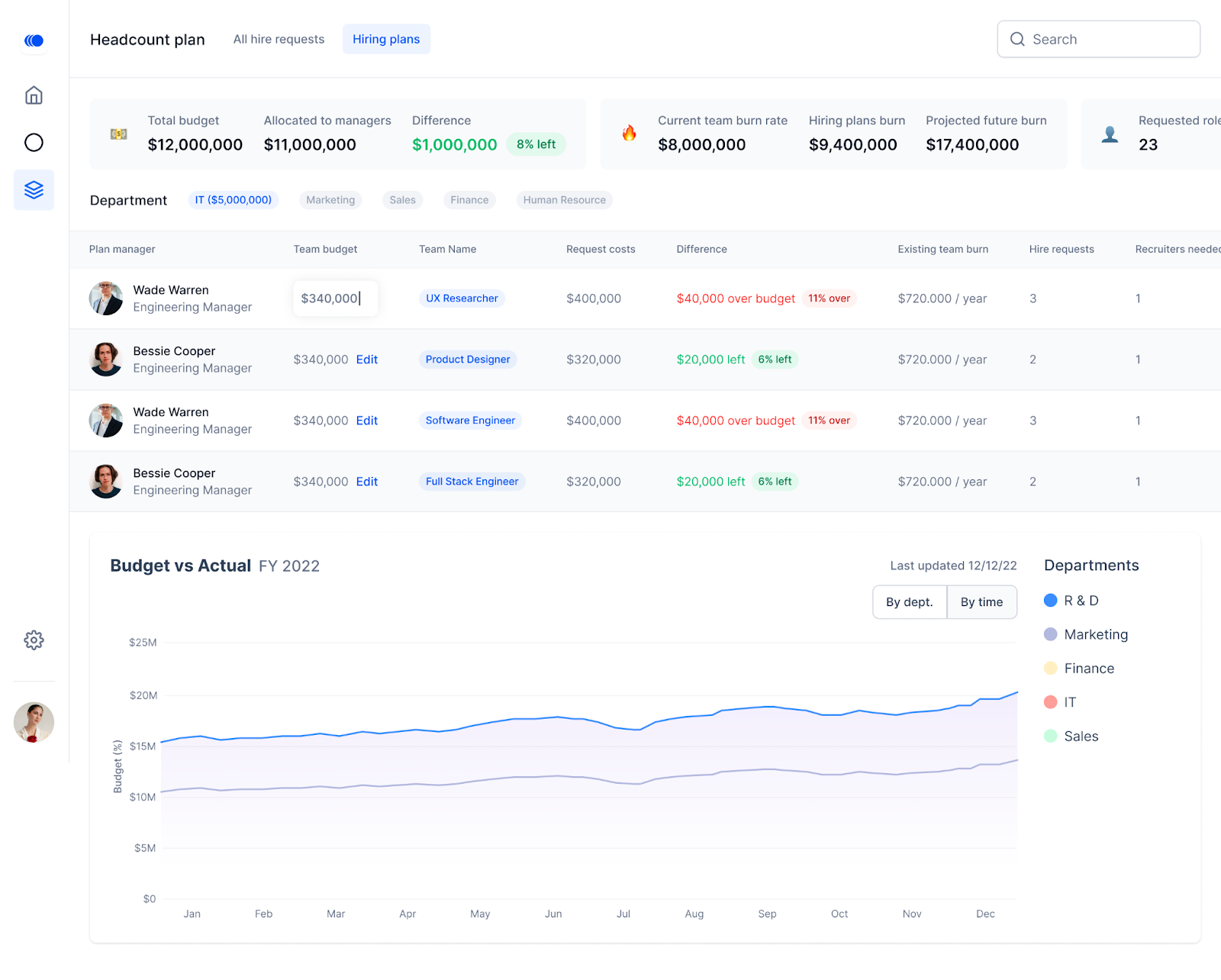
Pro Tip: You can use Glassdoor, Payscale, or Salary to find salary ranges for each role.
If you’re a global tech company, Agentnoon has a nifty salary calculator:
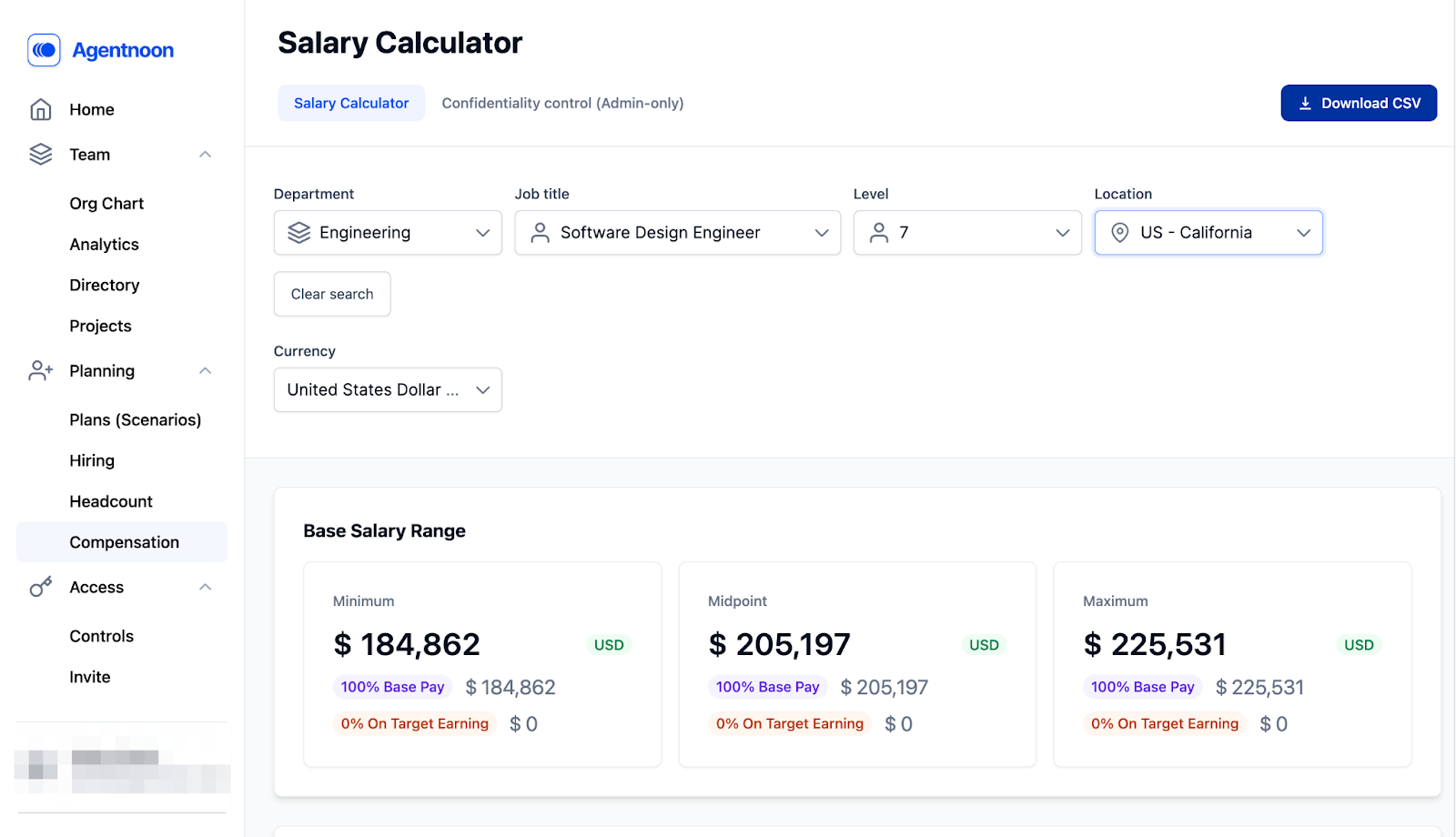
You’ll get accurate salary ranges for roles based on title, seniority, and location.
Plus, confidentiality controls ensure only the right people have access to salary data. Give it a try! 😉

Now you have a list of key roles to hire for along with a hiring budget for each role. Time to secure buy-in from your team.
If you’re the CEO of a startup, feel free to skip this section. But if you’re a large org, this step is especially crucial.
Hiring is a holistic process and requires collaboration between different teams. To succeed, everybody has to be on the same page. The talent planning team, finance specialists, HR department, and most importantly senior execs.
The point: Transparency and alignment are key.
The old-fashioned way to ensure alignment: Emails, PowerPoint, and meetings.
A faster way is by creating hiring requests for headcount planning in Agentnoon.
All your team has to do is make a hiring request. You and human resources can decide if you want to approve or reject the request for your workforce planning.
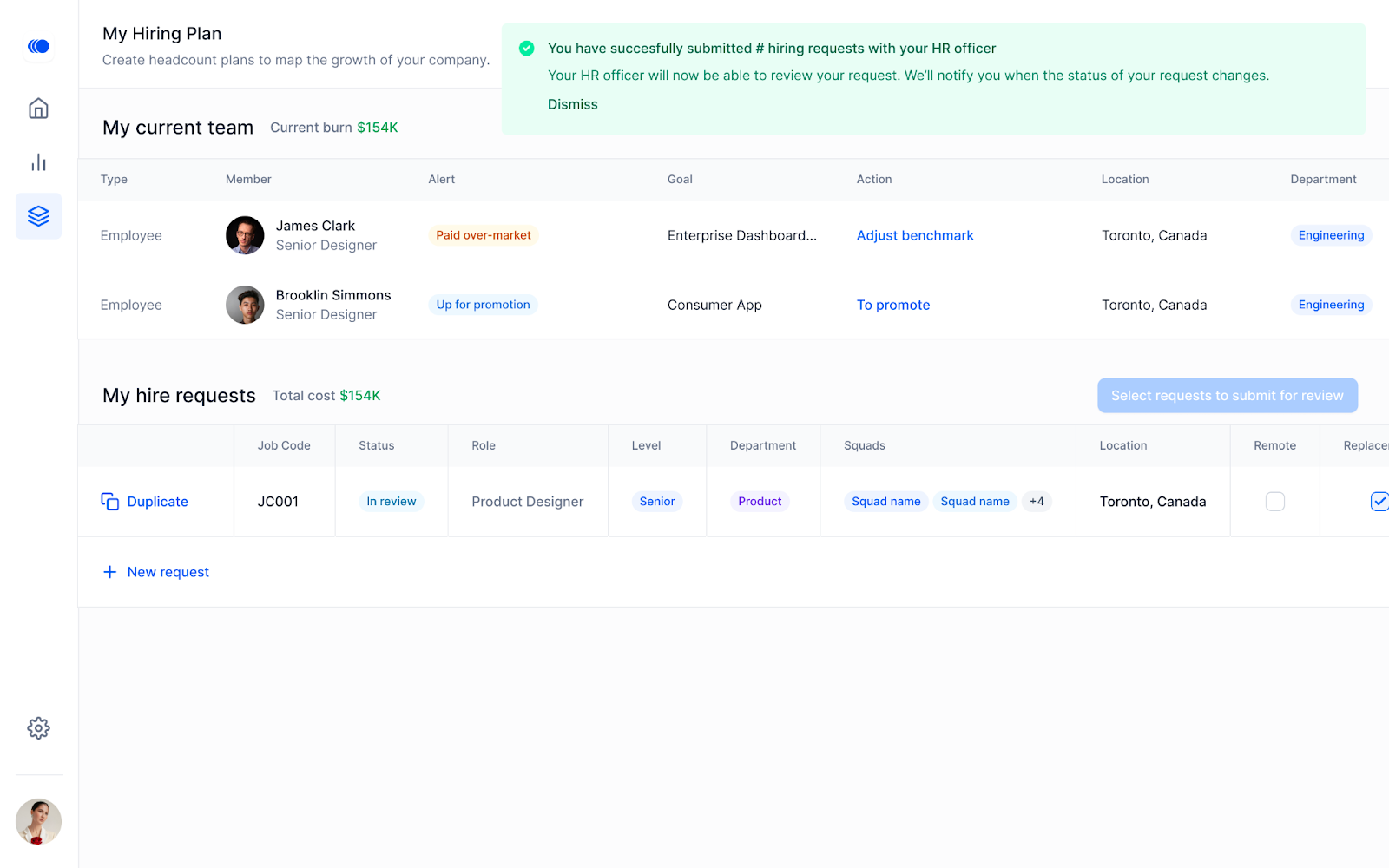
Remember: The more stakeholders in your company, the more you need to pay attention to this step.
Your ideal headcount plan is ready. But unfortunately, we live in an unpredictable world. Which means we have a few more steps to go.
Starting with forecasting costs.
Your main barrier to achieving your business goals is going to your budget. Which will determine your headcount planning process.
To forecast costs, you’ll need to involve the finance department. If you have one.
If you don’t, start by reviewing your:
You’ll find all this information in your FP&A tool. If you use Agentnoon, you’ll find your burn rate in hiring plans (scenarios):

Based on this information, figure out your financial capability to hire. Now and in the future.
Once you’ve taken stock of your current resources, talk to your HR team about salary expectations. Finally, forecast your future workforce costs. Add expected salary ranges (from step 4) for each role in this forecast.
An in-depth section on headcount forecasting is out of scope for this guide. But if you use Excel, here’s a handy model by Ben Murray:
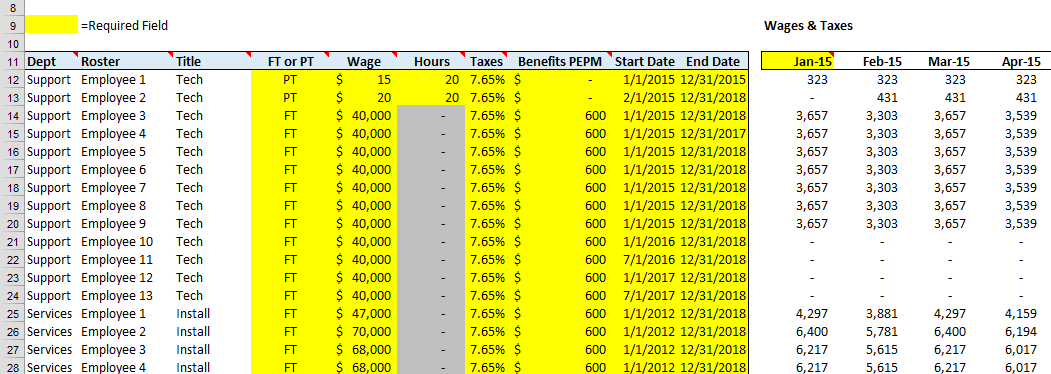
Get Headcount Planning template (Excel)
This model accounts for salaries, part-time/full-time hours, and payroll taxes. Plus, it’s automated (with formulas) so you don’t need to spend hours updating it.
Ben explains why headcount forecasting is important:
“Headcount expenses often represent the largest expense on a software company’s P&L. It’s important to spend the time to develop a detailed headcount forecast model so that not only your wage forecast is accurate but also your cash flow forecast.”
Further Reading: How to Create Detailed Headcount Forecasts
If you’re using Agentnoon, headcount forecasting is dead simple.
Here’s a quick demo:

Forecasting costs are quintessential. But by itself, it isn’t enough.
The future is unpredictable. Resignations, mass layoffs, recessions, remote and hybrid work, and market changes are just a few events that occur randomly.
The best leaders don’t just survive during uncertainty. They thrive in it.
How? By planning for it. This is where workforce planning scenarios come into play.
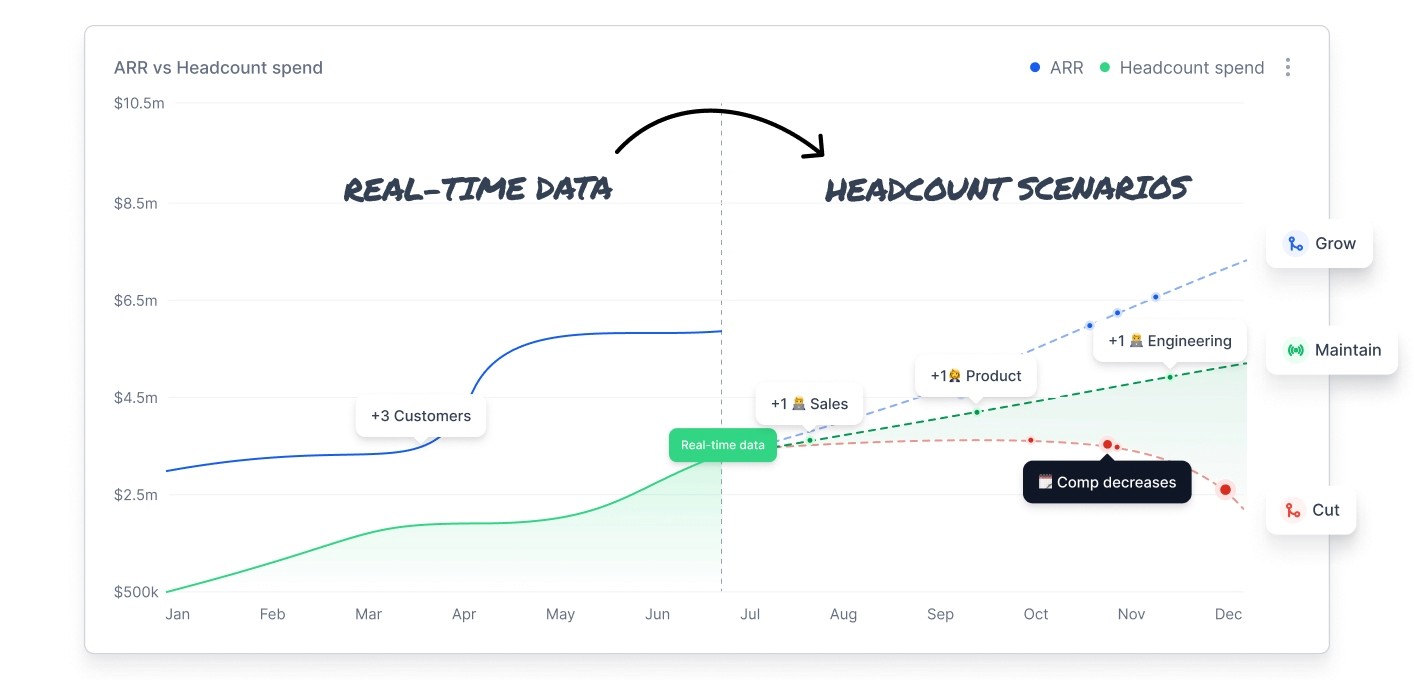
Anticipating different scenarios for your future workforce is critical if you want to thrive in uncertainty. This way you can prepare contingency plans that allow you to allocate resources and staff for multiple scenarios in the best way possible.
Scenario planning is an optional step. But if you want to be an antifragile organization, don’t ignore it. You, as a leader, and your HR professionals should allocate time to building multiple headcount plans for different scenarios.
Antifragility: things that not only gain from chaos but need it to flourish. Antifragile goes beyond resilient. The resilient resists shocks and stays the same; the antifragile gets better.
Planning scenarios is easy with Agentnoon.
Here’s what it looks like:
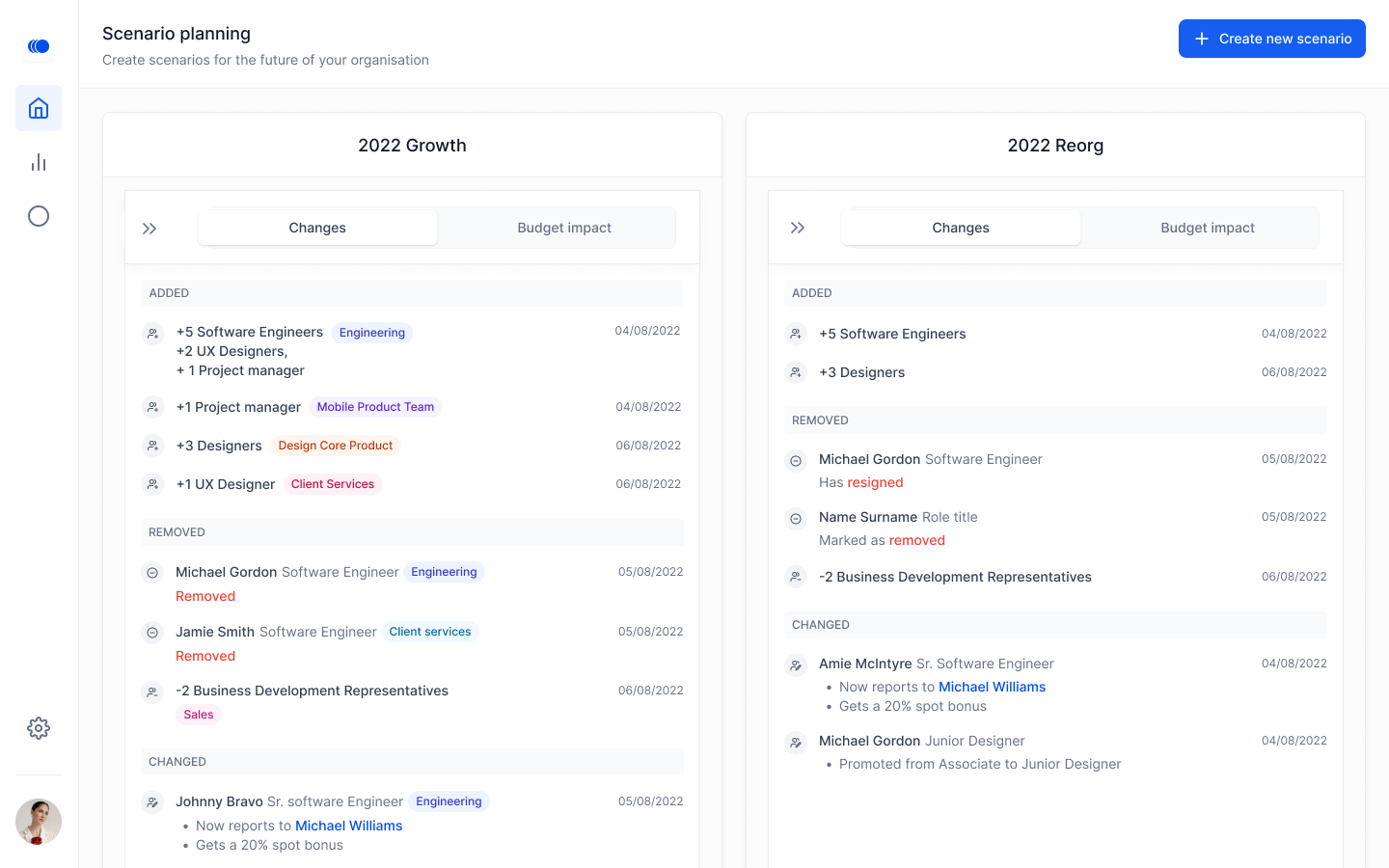

If you’ve already uploaded your data into Agentnoon, we’ll do most of the heavy lifting for you. All you have to do is create a scenario!
The kicker: You can create unlimited hiring plans (or scenarios) with Agentnoon!
Alternatively, you can use Causal for Google Sheets:

It’s a nifty add-on that lets you run multiple scenarios. Without leaving Google Sheets.
Most companies plan headcount annually. The problem: headcount planning is a continual process. It isn’t something you do at the end of each year.
“The best-laid plans of mice and men are never right.”
– Robert Burns
Maybe you prefer Murphy’s Law:
“Anything that can go wrong will go wrong.”
Will your current org structure help you achieve your growth goals? Account for market changes, recessions, layoffs, etc. And positive events like raising funds from investors or launching a new product.
It’s important to review your headcount plan each quarter (earlier is better). This way you can make any course corrections if needed. With minimal impact on the budget.
Use Excel for headcount planning? Treat it as a living document. Work with your HR professionals to review and revise your headcount plan frequently.
Agentnoon lets you manage by exceptions. This means you can review headcount plans in ~10 minutes (vs spreadsheets).
Here’s how to track headcount easily:

Agentnoon gives you real-time access to people data. So you can grow your business with confidence (while staying on budget).
Make headcount planning agile. If you do it right, your headcount plan will help you respond to randomness quickly and effectively.
Your headcount planning = complete.
Follow these 7 EASY steps to plan headcount effectively. You’ll find that your headcount plan is not only operationally effective but also financially accurate. Plus, spending weeks planning headcount will now be a thing of the past.
The best part? No more fear of going over budget when doing workforce planning with Agentnoon 😉
The best execs develop flexible headcount plans for multiple scenarios. They tie headcount decisions to business outcomes and performance. Most importantly, they adjust plans quickly with limited impact on execution.

Discover the strategic value of headcount planning in our comprehensive guide. We delve into its importance for financial leaders and provide a...
This blog post aims to elucidate the key differences between headcount planning and workforce planning, offering insights into their unique roles
Master headcount planning in the tech sector with our guide. Learn strategic forecasting, skill assessment, and talent management for industry...
